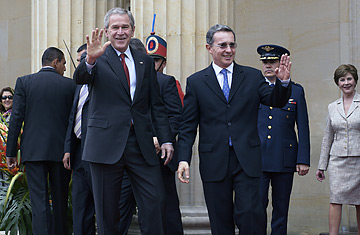
U.S. President George W. Bush meets with Colombian President Alvaro Uribe in Bogota, Colombia, March 11, 2007.
Only in a country that eight years ago was considered a failed state could that be called progress. But kidnappings are down ten-fold in the past four years, and the annual murder rate has dropped from 28,000 to 17,000. Defense Minister Juan Manuel Santos claims that heroin production has been eliminated in the country, once the world's third largest producer, and that coca eradication programs have drastically cut production. The economy is growing at 7%, inflation is low and exports are up. Uribe's popularity has soared to 73% as a result. "The major success is in winning the hearts and minds of the people," Santos says.
By contrast, Guatemala, which Bush visits Monday, has made little progress in addressing its problems. "The government has been utterly paralyzed and ineffective in addressing the fundamental issue which is the extent to which organized crime, often involving former military officers and others, have infiltrated Guatemalan society to an extent that it threatens democracy itself there," says Tim Rieser, the top Senate Democratic staffer on foreign aid. 'At least Uribe was able to come up with a program that rallied the country behind him," he says.
Uribe's approach holds lessons for Bush's attempt to stabilize Baghdad. Popular support is what wins counterinsurgency wars, and it is the institutions of state that produce that support. "We have a policy of 'clear and hold,'" Santos says, "But the 'hold' is crucial." After you drive out insurgents, as American and Iraqi troops are attempting to do in Baghdad, "You must come in with the rest of the state: doctors, roads, schools," Santos says.
Bush talks the game when it comes to building institutions. "The United States cares deeply about the human condition," Bush said at his Bogota press conference Sunday, "Much of our aid is aimed at helping people realize their God-given potential." Bush's budget request for Colombia in 2008, however, still places heavy emphasis on military aid to the country. Says Rieser, "It's virtually a Xerox of the previous year; it has nothing to reflect some of the changes that have occurred there." In Iraq, U.S. forces cleared and then abandoned by Fallujah, which was soon retaken by insurgents.
The other lesson Colombia provides is the importance of strong leadership. Guatemala's weak government is struggling to impose order and Iraq's central government is incapable of providing security. Uribe's strength has gained him the support of Colombian society and is giving the country a chance. The question now is whether he is strong enough, and sincere enough, to further build public trust by improving the country's human rights record and going after tainted officials in government and the military.
I asked Santos about the recent rise in extrajudicial killings by the military. "We're investigating that," he said. "If we don't improve on human rights, we're committing suicide," he says. He claims recently to have removed a colonel who was accused of human rights violations and to have established an independent organization to administer military justice. Santos has made a positive impression on Democrats in Washington, but deep skepticism remains over Uribe's commitment to human rights.
